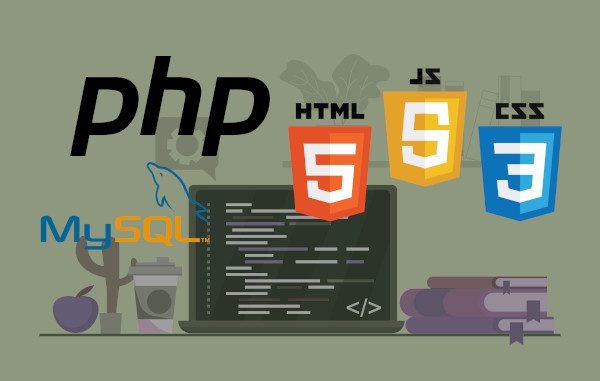(last updated 04 Oct 2020)
Here ill shares some simple tips and tricks that I’ve learned as a Junior PHP Web Developer. And the list will be updated.
First of all – everyone learns in their own way. Find yours. By watching videos, reading, or doing tutorials. Check my list of favorite learning sources and links for PHP Web Developers.
Important – Don’t forget to use your favorite OS and Software/Stack. I chose for web development environment Linux Kubuntu/LAMP and most shares will be related to them. Some are easy to reimplement in Windows or Mac.

1. Learn and Use the Console/Terminal for daily work
- Define how to display the Apache error log with a simple command – link
- Or How to use the Apache error log for debug – link
- Check your free disk space from a console in human mode
df -h
- Check your free disk space from a console in Treesize style
sudo du -chd 1 | sort -hr
- Add your daily long-boring commands to your console by editing the bashrc file – Read my article here
- Use Git with GitHub or GitLab
- create a new folder with non-existing parent directory path with a simple “-p” parameter. dir1, dir2, and dir3 will be created automatically
mkdir -p /dir1/dir2/dir3/newDir
2. A few simple tricks when working with MySQL
Working with MySQL? Enhance your productivity with these helpful tips and tricks:
- Optimize Queries: Write efficient SQL queries by using appropriate indexes, optimizing joins, and avoiding unnecessary subqueries. Utilize EXPLAIN to analyze query execution plans and identify performance bottlenecks.
- Backup Regularly: Implement a regular backup strategy to prevent data loss in case of unexpected events. MySQL offers various backup methods such as mysqldump, binary logging, or third-party backup solutions.
- Secure Your Database: Protect your database from unauthorized access and potential security threats. Implement strong passwords, limit user privileges, and regularly apply security patches to MySQL servers.
- Use Transactions: Ensure data integrity and consistency by using transactions for operations that involve multiple SQL statements. Begin transactions with START TRANSACTION, and commit or rollback changes as needed.
- Monitor Performance: Monitor MySQL server performance using tools like MySQL Workbench, MySQL Enterprise Monitor, or third-party monitoring solutions. Keep an eye on key metrics such as CPU usage, memory usage, disk I/O, and query execution times.
- Cache Query Results: Improve application performance by caching frequently executed queries and their results. Consider using tools like memcached or Redis for caching SQL query results in memory.
- Normalize Your Database: Design your database schema following normalization principles to minimize redundancy and improve data integrity. Use primary keys, foreign keys, and appropriate data types to establish relationships between tables.
- **Avoid SELECT ***: Instead of selecting all columns with SELECT *, explicitly specify the columns you need. This reduces network traffic and improves query performance, especially for large tables.
- Use Stored Procedures: Leverage stored procedures to encapsulate frequently executed SQL logic on the server side. Stored procedures can enhance code reusability, improve security, and provide better performance compared to ad-hoc SQL queries.
- Regularly Update Statistics: Update table statistics using ANALYZE TABLE to ensure the MySQL query optimizer makes informed decisions when generating query execution plans. This helps optimize query performance over time.
Incorporate these tips into your MySQL workflow to streamline development, improve performance, and ensure the security and reliability of your database system.
3. Prepare for interviews
- Know Your Basics: Ensure you have a solid grasp of fundamental programming concepts, data structures, and algorithms. Practice coding problems regularly on platforms like LeetCode or HackerRank.
- Build Projects: Showcase your skills by working on personal projects. Whether it’s a web app, mobile app, or a small tool, having tangible projects to discuss can greatly impress interviewers.
- Understand the Company: Research the company you’re interviewing with. Understand their products, tech stack, and any recent news. Tailor your responses to show how you can contribute to their specific needs.
- Practice Behavioral Questions: Be ready to discuss your past experiences and how you’ve handled challenges. Practice answering behavioral questions that assess your teamwork, problem-solving, and communication skills.
- Mock Interviews: Conduct mock interviews with friends, mentors, or through online platforms. This helps you get comfortable with the interview format and receive valuable feedback.
- Stay Updated: Keep up with industry trends, new technologies, and best practices. Subscribe to relevant blogs, follow influential developers on social media, and attend meetups or webinars.
- Polish Your Resume and Portfolio: Ensure your resume highlights relevant skills and experiences. Create a portfolio showcasing your projects, code samples, and any contributions to open-source projects.
- Ask Questions: Prepare thoughtful questions to ask your interviewer. This demonstrates your interest in the role and company culture.
- Stay Calm and Confident: Remember to stay calm and confident during the interview. Take a deep breath, listen carefully to questions, and take your time when answering.
- Follow-up: Send a thank-you email after the interview to express your gratitude and reiterate your interest in the position.
By following these tips and putting in the effort to prepare, you’ll be well-equipped to ace your interviews and land that junior developer role!
Exercise links
- https://www.simplilearn.com/php-interview-questions-article
- https://intellipaat.com/blog/interview-question/php-interview-questions/
Views: 78
